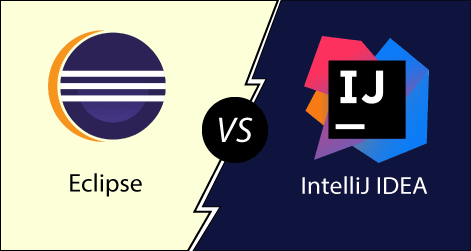Difference between IntelliJ Idea and EclipseIntelliJ IdeaIntelliJ IDEA is the most powerful, popular, and fully-featured IDE for Java Developers, which was released for the public in 2001. It is developed and maintained by Jet Brains Company. It is licensed by Apache 2.0. IntelliJ Idea is available in two editions: Community Edition: It is available for free and mostly used for Java and Android developers. It supports most of the languages such as Java, Kotlin, Groovy, Clojure, Scala and others. It includes features like Code Completion, Deep static analysis, intelligent refactoring, debugger, test runner, etc. Ultimate Edition: The ultimate edition has the most advanced set of features for developing web and desktop application. It supports the integration of spring framework, web development framework like Node.js, Angular, and React, Java EE support such as JSF, JAX-RS, JPA, CDI, etc. EclipseEclipse is an open-source IDE for developing applications using the Java, Python, Ruby, C, C++, etc. The IBM released it in 2001 under the Eclipse Public License (EPL). It became popular soon for developing free and commercial projects. Today, it became the most popular Java IDE. It contains a base workspace and an extensible plug-in system for customizing the environment. 
There are lots of disputes on this topic which makes it difficult to decide which of them are the most important. As a result, most of the developers claim that both IDEs are equal in their capabilities, and choosing any of them is a matter of taste. But, I assume that it's not a matter of taste only. There are reasons which help you to distinguish the differences between both of them. 1. System RequirementsWe can install IntelliJ Idea on Windows, macOS and Linux with the following hardware:
We can run Eclipse IDE on any platform that supports JVM including Windows, macOS, Linux and Solaris. It demands the following hardware:
2. DebuggingAs of the debugging process, sometimes we want to evaluate some expression to see its value. In Eclipse, you need to select the whole expression. Otherwise, the eclipse cannot evaluate it. But, with IntelliJ Idea, you do not need to select the whole expression. You just put the cursor at any place inside the expression and press Alt+F8. IntelliJ Idea understands which expression you have a need and shows a dialog window suggesting several possible variants for the expression. You can also edit and evaluate the expression in this dialog window. 3. AutocompleteAutocomplete is an option which differs the any IDE from notepad. Here, feeling the context gives IntelliJ Idea a qualitative advantage over Eclipse. For example, we started writing a code: Now, we want to find what options can start with letters "vi". IntelliJ immediately understands the method that wants a Condition class instance as a second parameter, which is Condition.visible. So, IntelliJ immediately suggests the only valid option for the method, whereas Eclipse cannot understand the valid context quickly. It does not know that the cursor is located where the second parameter of the method should place. So when you press the Ctrl + Space, Eclipse shows everything that begins with the letters "vi" which useless information. 4. RefactoringAll the modern IDE provides a very impressive set of refactoring. But, IntelliJ Idea refactoring is more intelligent as compared to other IDE. It can easily understand what you want and provides many options which are suitable for most situations. 5. PluginsEclipse marketplace provides more than 1250 plugins, whereas IntelliJ Idea offers approx. 750 plugins only. But, the plugins difference doesn't make much difference because plugins for new technology usually created mainly for the Eclipse. 6. PerformanceThe more plugins installed in the IDE make it more heavy for your computer. However, Eclipse handles the large projects faster as compared to IntelliJ Idea because it indexes the entire project on start-up. But, when you are working on an existing project, IntelliJ Idea works faster and smoother as compared to Eclipse. 7. UsabilityIntelliJ is much easier to use as compared to Eclipse. The learning curve is far faster in IntelliJ, which makes developing easier and more natural. Code completion, Dropdowns, quick view, project wizards, etc. are all possible in both Eclipse and IntelliJ, but the user experience in IntelliJ is much more satisfying.
Next TopicIntelliJ IDEA Window Elements
|
 For Videos Join Our Youtube Channel: Join Now
For Videos Join Our Youtube Channel: Join Now
Feedback
- Send your Feedback to [email protected]
Help Others, Please Share










